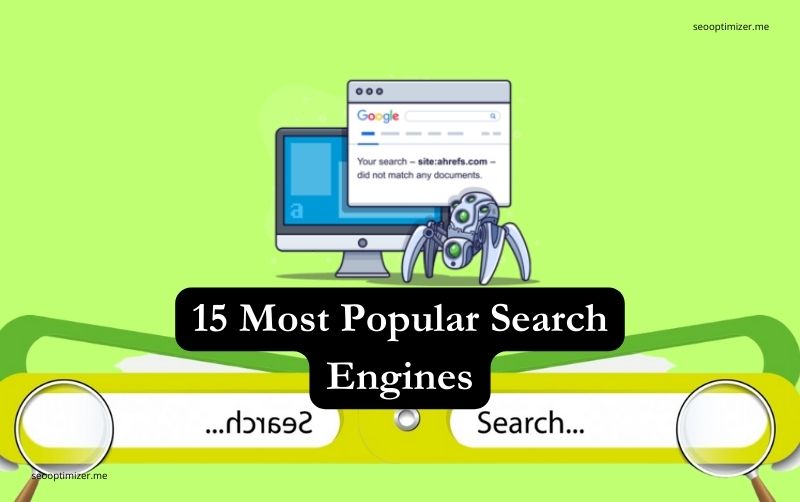15 Most Popular Search Engines in 2024

In this article, I cover 15 most popular search engines in the worlsd including their pros and cons. Over the years, several search engines have emerged, each with its unique features and strengths.
15 Most Popular Search Engines - Search Engine List
1. Google
Google is one of the popular search engines which started as a research project by Larry Page and Sergey Brin at Stanford University. At the time, the two aimed to create a more efficient and effective search engine by analyzing the relationships between websites. Google quickly gained popularity due to its accurate and relevant search results, which eventually led to its dominance in the search engine market. Google now dominates the market with its user-friendly interface and unparalleled search algorithms. With a vast index of web pages, Google provides highly relevant and accurate search results.
Year Founded: 1998
Founders: Larry Page and Sergey Brin
Google Pros:
- Wih goog accuracy and Relevance, Google's search algorithms provides precised and tailor and highly relevant results based on user queries.
- Google has maintained a user-Friendly Interfacesince its creation. The minimalist design and intuitive layout make Google accessible and easy to use for users of all ages and technical proficiency.
- Beyond traditional searches, Google offers specialized searches such as images, videos, news, and more.
Google Cons:
- Google's data collection practices have raised privacy concerns, as the company gathers extensive user information for targeted advertising.
- Google's overwhelming market share has sparked concerns about a lack of competition and potential monopolistic practices.
Also read: Google Indexing and How Web Crawler Works - Comprehensive Guide
Read also: Website Speed Checker - 5 Best tools For Testing Website Speed
2. Bing
Bing is Microsoft's search engine and it is one of the best search engines. It introduced as a successor to Live Search. Microsoft aimed to provide users with a visually appealing and more organized search experience. Bing incorporates features like image and video previews, and it powers the search results for other Microsoft products, including Yahoo.
Year Launched: 2009
Founded by: Microsoft
Bing Pros:
- Bing's image search and video previews enhance the visual experience, which allows users to preview search results before clicking on them.
- Bing Rewards offers users incentives such as gift cards and discounts for using the search engine, encouraging loyalty.
Bing Cons:
- Bing's index is smaller compared to Google, which may result in slightly less comprehensive search results.
- Despite its merits, Bing is not as widely used as Google.
3. Yahoo
Yahoo is one of the popular search engines that began as a directory of websites created by Stanford University students Jerry Yang and David Filo. Over time, it expanded its services to include a search engine. Yahoo was once a dominant player in the search engine industry but later transitioned into a web portal that utilizes Bing's search technology.
Year Founded: 1994
Founders: Jerry Yang and David Filo
Yahoo Pros:
- Yahoo's search engine is seamlessly integrated with its news, email, and other services, providing users with a comprehensive online experience.
- Similar to Google, Yahoo has an intuitive interface that appeals to a broad audience.
Yahoo Cons:
- Yahoo's reliance on Bing for search results means it may not offer a significantly different experience from using Bing directly.
- Yahoo's decline in popularity as a standalone search engine limits its relevance.
4. Baidu
Baidu is China's leading search engine, founded by Robin Li in 2000. The company focused on developing a search engine that caters specifically to the Chinese language. Baidu has become an integral part of the Chinese internet ecosystem, It offers a range of services beyond traditional search, including maps, music, and knowledge.
Year Founded: 2000
Founder: Robin Li
Baidu Pros:
- Baidu excels in handling Chinese-language search queries, making it the preferred choice for users in China.
- Baidu offers a range of services, including maps, music, and a knowledge base, creating a comprehensive online ecosystem.
Baidu Cons:
- Baidu's primary focus on the Chinese market means that it may not be as effective for English-language searches.
- Baidu faces criticism for complying with Chinese government censorship regulations, impacting search results.
Read also: SEO Education - 5 Reasons Why SEO Isn't Taught in Universities
Also read: Difference Between Short and Long tailed keywords in SEO
5. Yandex
Yandex is one of the popular search engines, a Russian search engine and was founded by Arkady Volozh and Ilya Segalovich. It quickly gained popularity in Russia and neighboring countries. Yandex places a strong emphasis on understanding the context of search queries, and it has expanded its services to include maps, news, and more.
Year Founded: 1997
Founders: Arkady Volozh and Ilya Segalovich
Yandex Pros:
- Yandex excels in understanding the context of search queries, as it delivers highly relevant results.
- In addition to search, Yandex provides services such as maps, news, and a popular email platform, creating an all-encompassing online experience.
Yandex Cons:
- Primary user base is in Russia, limiting its global reach compared to search engines with a more international focus.
- For users who do not speak Russian, the language barrier may pose challenges when using Yandex.
6. DuckDuckGo
DuckDuckGo was created by Gabriel Weinberg with a focus on user privacy. It differentiates itself by not tracking user data or personalizing search results. DuckDuckGo gained popularity as users became more concerned about online privacy, positioning itself as a privacy-centric alternative to mainstream search engines.
Year Founded: 2008
Founder: Gabriel Weinberg
DuckDuckGo Pros:
- DuckDuckGo doesn't track user data, ensuring a more private search experience compared to other search engines.
- The lack of personalized search results means users receive unbiased and unfiltered information.
DuckDuckGo Cons:
- DuckDuckGo's index is smaller compared to major players like Google, potentially leading to less comprehensive search results.
- While privacy is a key focus, DuckDuckGo may lack some of the advanced features offered by other search engines.
7. Ask.com
It was formally known as Ask Jeeves. Ask.com introduced a unique approach to searching by allowing users to ask questions in natural language. The search engine aimed to provide direct answers to queries. Over time, Ask.com evolved and rebranded, maintaining its focus on delivering high-quality content.
Year Founded: 1996
Founders: Garrett Gruener, David Warthen
Ask Pros:
- Ask.com encourages users to ask questions in natural language, making it a user-friendly option for those seeking direct answers.
- It places emphasis on providing high-quality content in response to user queries.
Ask Cons:
- Ask.com has a relatively small market share compared to major players like Google and Bing.
- The search engine may lack some of the advanced features and services offered by its competitors.
Also read: 268 Popular SEO keywords
Read also: 145 SEO Abbreviations, Acronyms, and Meanings
8. AOL Search
AOL Search was part of America Online's suite of services during the internet's early days. It integrated search functionality with other AOL services, including news, email, and entertainment. Over the years, AOL Search has evolved, and it currently relies on Bing's search technology.
Year Launched: 1999
AOL Search Pros:
- AOL Search is integrated with various AOL services, offering users a comprehensive online platform.
- User-Friendly Interface: The familiar interface may appeal to users who have a history with AOL.
AOL Search Cons:
- Like Yahoo, AOL Search relies on Bing for search results, potentially limiting its differentiation from using Bing directly.
- AOL Search has experienced a decline in popularity, and its relevance is not as prominent as in its earlier years.
9. WolframAlpha
WolframAlpha is not a traditional search engine but a computational knowledge engine. It was founded by Stephen Wolfram, it computes answers to factual queries using curated data and algorithms. It's designed to provide users with computational and factual information rather than traditional web search results.
Year Launched: 2009
Founder: Stephen Wolfram
WolframAlphs Pros:
- WolframAlpha excels in providing computational answers to factual queries, making it a valuable tool for students, researchers, and professionals.
- The engine relies on curated data, ensuring accuracy and reliability in the answers it generates.
WolframAlphs Cons:
- WolframAlpha is not designed for general web searches and may not be suitable for users seeking information outside the scope of factual queries.
- The computational approach may have a steeper learning curve for casual users accustomed to traditional search engines.
10. Excite
Excite was one of the early or old search engines. It aggregated search results from various sources and provided integrated services such as news, email, and more. Excite, once a major player, has experienced a decline in popularity over the years.
Year Founded: 1995
Founders: Joe Kraus, Graham Spencer, Mark Van Haren, Ryan McIntyre, Ben Lutch
Excite Pros:
- Excite pulls search results from multiple search engines, providing users with a diverse range of sources.
- Excite offers integrated services, including news, email, and more, creating a centralized online platform.
Excite Cons:
- Excite relies on other search engines for its results, potentially limiting its ability to offer a unique search experience.
- Excite has experienced a decline in popularity over the years, and its relevance is not as prominent as it once was.
Also read: Top 10 AI Writing Tools for Content Automation
Also read: How to Optimize Website Speed For SEO
11. Gigablast
Gigablast is an independent search engine founded by Matt Wells. It aims to provide a customizable and user-friendly search experience. Gigablast allows users to customize search settings and emphasizes user privacy by not storing personal information or search history.
Year Launched: 2000
Founder: Matt Wells
Gigablast Pros:
- Gigablast allows users to customize search settings, providing a more personalized search experience.
- The search engine emphasizes user privacy and does not store personal information or search history.
Gigablast Cons:
- Gigablast's index is smaller compared to major search engines, potentially resulting in less comprehensive search results.
- The search engine may lack some of the advanced features offered by larger competitors.
12. Swisscows
Swisscows is a privacy-focused search engine that emerged in Switzerland. It differentiates itself by avoiding data collection and personalized tracking, providing users with a more private search experience. The use of a semantic map enhances the relevance of search results.
Year Launched: 2014
Swisscows Pros:
- Swisscows places a strong emphasis on user privacy, refraining from collecting personal data or utilizing tracking mechanisms.
- The use of a semantic map enhances the relevance of search results, providing users with a more contextually accurate experience.
Swisscows Cons:
- Swisscows' index may be smaller compared to major search engines, potentially impacting the comprehensiveness of search results.
- The search engine may be more effective for certain languages, and its effectiveness in languages other than German may vary.
13. Naver
Naver is one of the popular search engines and it is a South Korean search engine founded by Lee Hae-jin. It initially started as an online platform for knowledge sharing before evolving into a comprehensive search engine. Naver excels in handling Korean-language searches and offers various integrated services.
Year Founded: 1999
Founder: Lee Hae-jin
Naver Pros:
- Naver excels in handling Korean-language searches, making it the go-to choice for users in South Korea.
- Naver provides an integrated platform with services such as news, blogs, and a question-and-answer platform, enhancing the user experience.
Naver Cons:
- Naver's primary focus is on the Korean market, and it may not be as effective for users seeking information in languages other than Korean.
Also read: Backlinks for SEO - 8 Effective ways to Acquire High-Quality Backlinks
14. Yippy
Yippy was formerly known as Clusty. It is a metasearch engine that compiles search results from various sources and categorizes them into clusters. The goal is to provide users with a more organized and refined search experience. Yippy emphasizes user privacy by not tracking personal information.
Year Launched: 2009
Yippy Pros:
- Yippy categorizes search results into clusters, allowing users to explore information within specific themes or topics.
- Yippy emphasizes user privacy and does not track personal information or search history.
Yippy Cons:
- Yippy has a smaller market share compared to major search engines like Google, potentially resulting in fewer indexed pages.
15. Ecosia
Ecosia is a search engine with a strong environmental focus. it uses ad revenue to fund tree-planting projects globally. Ecosia aims to contribute to environmental sustainability, and users can participate in this initiative by using the search engine.
Year Launched: 2009
Founder: Christian Kroll
Ecosia Pros:
- Ecosia stands out for its commitment to environmental sustainability, with a portion of its ad revenue dedicated to tree-planting initiatives.
- Ecosia's interface is user-friendly and similar to other popular search engines, making it accessible to a broad audience.
Ecosia Cons:
- Ecosia's index may be smaller compared to major search engines, potentially impacting the breadth of search results.
- Ecosia's funding model relies on ad revenue, which may vary and could potentially impact the sustainability of tree-planting projects.
The Future of Search Engine and the Role of AI
The future of search engines is likely to be shaped by several factors with Artificial Intelligence (AI) playing a major role. Below are some key aspects that may define the future of search engines:
1. Personalization and Context Awareness:
- Future search engines are expected to become even more personalized, understanding user preferences and context to deliver highly relevant results. AI algorithms will analyze user behavior, search history, and other contextual cues to tailor search results to individual needs.
2. Voice and Natural Language Processing:
- The rise of voice-activated virtual assistants and smart speakers is influencing the future of search. Search engines will increasingly focus on natural language processing and voice recognition technologies, allowing users to interact with search engines using spoken queries in a more conversational manner.
3. Visual Search and Image Recognition:
- Visual search is gaining prominence, and search engines are likely to enhance their capabilities in recognizing and interpreting images. AI algorithms will play a crucial role in understanding the content of images and providing relevant information, opening up new possibilities for e-commerce, travel, and more.
Also read: What is Technical SEO
4. Semantic Search and Understanding Intent:
- Future search engines will continue to evolve toward semantic search, aiming to understand the intent behind user queries. AI algorithms will not just focus on keyword matching but will analyze the context, user history, and other factors to provide more nuanced and accurate results.
5. Mobile and Location-Based Search:
- With the increasing use of mobile devices, search engines will prioritize delivering location-based results. AI-powered algorithms will consider the user's location, preferences, and context to provide hyper-localized information, such as nearby businesses, events, and services.
6. Augmented Reality (AR) Integration:
- As AR technologies become more prevalent, search engines may integrate AR features to provide users with real-time information overlaid on their physical environment. This could include information about businesses, landmarks, or objects in the user's vicinity.
7. Evolving Ranking Algorithms:
- Search engine ranking algorithms will continue to evolve, placing more emphasis on factors such as content quality, user engagement, and trustworthiness. AI will play a crucial role in analyzing vast amounts of data to determine the credibility and relevance of web pages.
8. AI-Generated Content:
- AI technologies, including natural language generation (NLG), may contribute to the creation of content. Search engines might use AI-generated summaries, answers, or articles to enhance the diversity and depth of search results.
9. Cross-Platform Integration:
- Search engines are likely to integrate seamlessly across various platforms and devices. AI-driven personalization will ensure a consistent and tailored search experience, whether users are searching on a desktop, mobile device, or other connected devices.
10. Privacy and User Control:
- With growing concerns about privacy, future search engines may provide enhanced privacy features. AI algorithms will need to strike a balance between delivering personalized results and respecting user preferences for data privacy.
Suggested Reads:
Also read: SEO for Beginners – Ultimate Guide
Also read: RoadMap to Becoming An SEO Expert
Also read: 15 Top SEO Experts and Specialists
Also read: AI SEO – The Impact of Artificial Intelligence on SEO Strategies
Also read: Google Indexing and How Web Crawler Works




